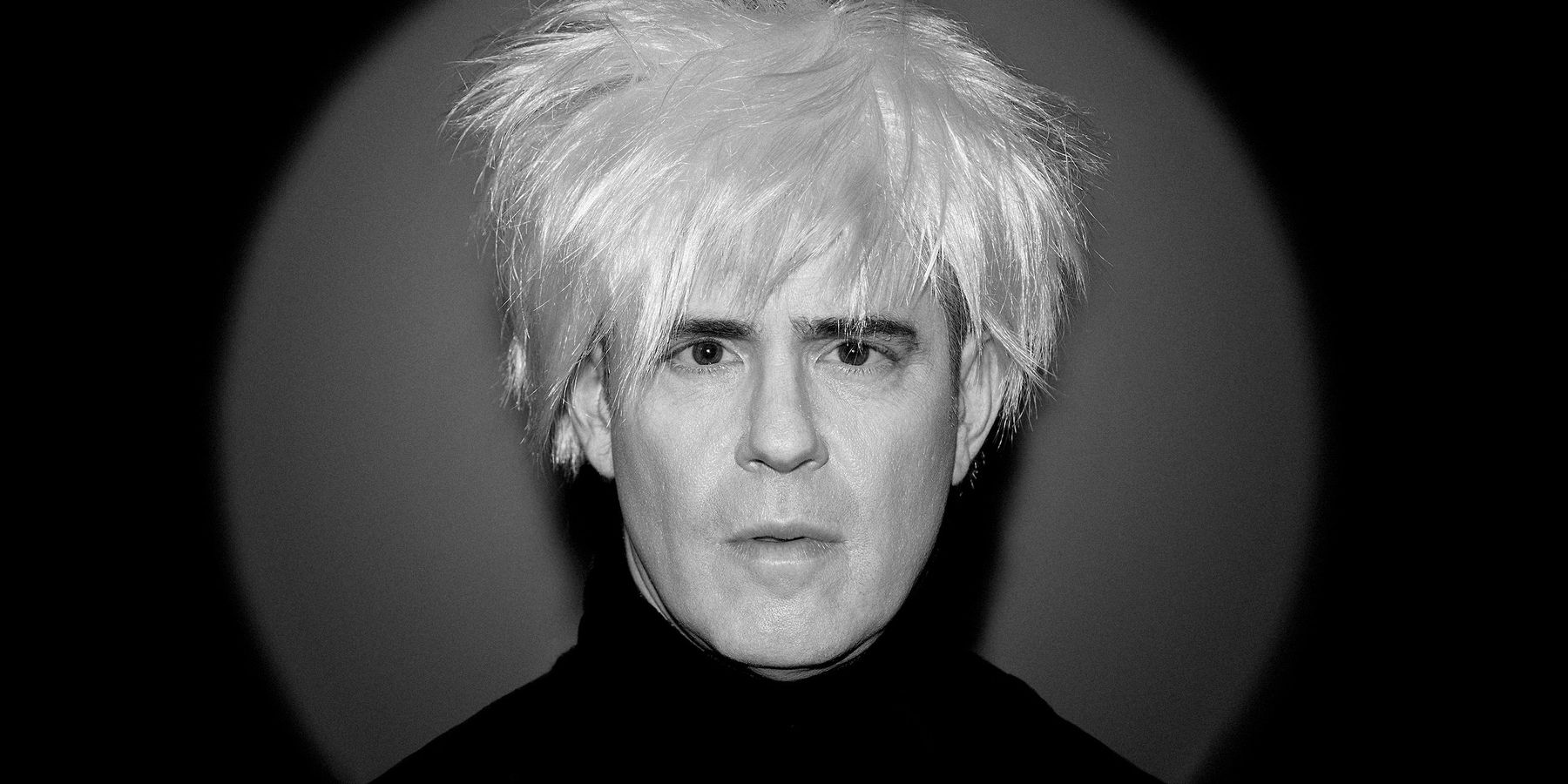
Pride
Andy Cohen's Factory
Story by Claire Valentine / Photography by Gizelle Hernandez / Styling by Cody Allen
26 June 2019

Andy Cohen is telling me something that I find hard to believe. The affable 51-year-old talk show host of both radio and television fame says he sometimes has a hard time recognizing people. "I'm terrible at faces, actually," he says in response to my suggestion that I picture him being like 30 Rock's Jack Donaghy, flipping through a deck of notable-people-flashcards at lightning speed. Not so with Cohen, though. "I've had people on my show and been at a party a week later, and introduced myself to them to have them say, 'I was a guest on your show last week." That's fair, I counter. "Yeah," he says, "Not great."
Few professions require the kind of extreme interpersonal recall as a talk show host, excluding perhaps being a popular politician or the maître d′ of the hottest restaurant in town. Cohen has a unique perch in the entertainment industry as not only a skilled interviewer known for getting his subjects to speak more candidly than they might on say, Jimmy Fallon's couch, but for creating the careers of some of the very guests on his show.
Related | Janelle Monáe: Trans Folks to the Front
The Real Housewives franchise in particular, which Cohen likens to a series of soap operas, contains a legion of characters conjured nearly out of thin air, through the timeless alchemy of costume, makeup, setting and drama both manufactured and "real." On his nightly show, Watch What Happens Live With Andy Cohen (WWHL), Cohen directs not just the after show — the epilogue — live on air, but also the overture, the aria, the recitative and the chorus. When it's all said and done, it appears he's crafted the whole opera itself.
Cohen famously watches every episode of the franchise, which includes seven current installments in the U.S. alone. It's amazing, then, that he can remember all those storylines, all those characters. It's hard to say which role requires his encyclopedic knowledge of reality tv drama more: being executive producer of the series (following years of producing high performing shows for Bravo like Top Chef, Project Runway and the original Queer Eye), or host of not only the high-tension reunion episodes that he's said amount to the Housewives' Super Bowl, but also WWHL, which is live nearly every weeknight, now 10 years on the air.
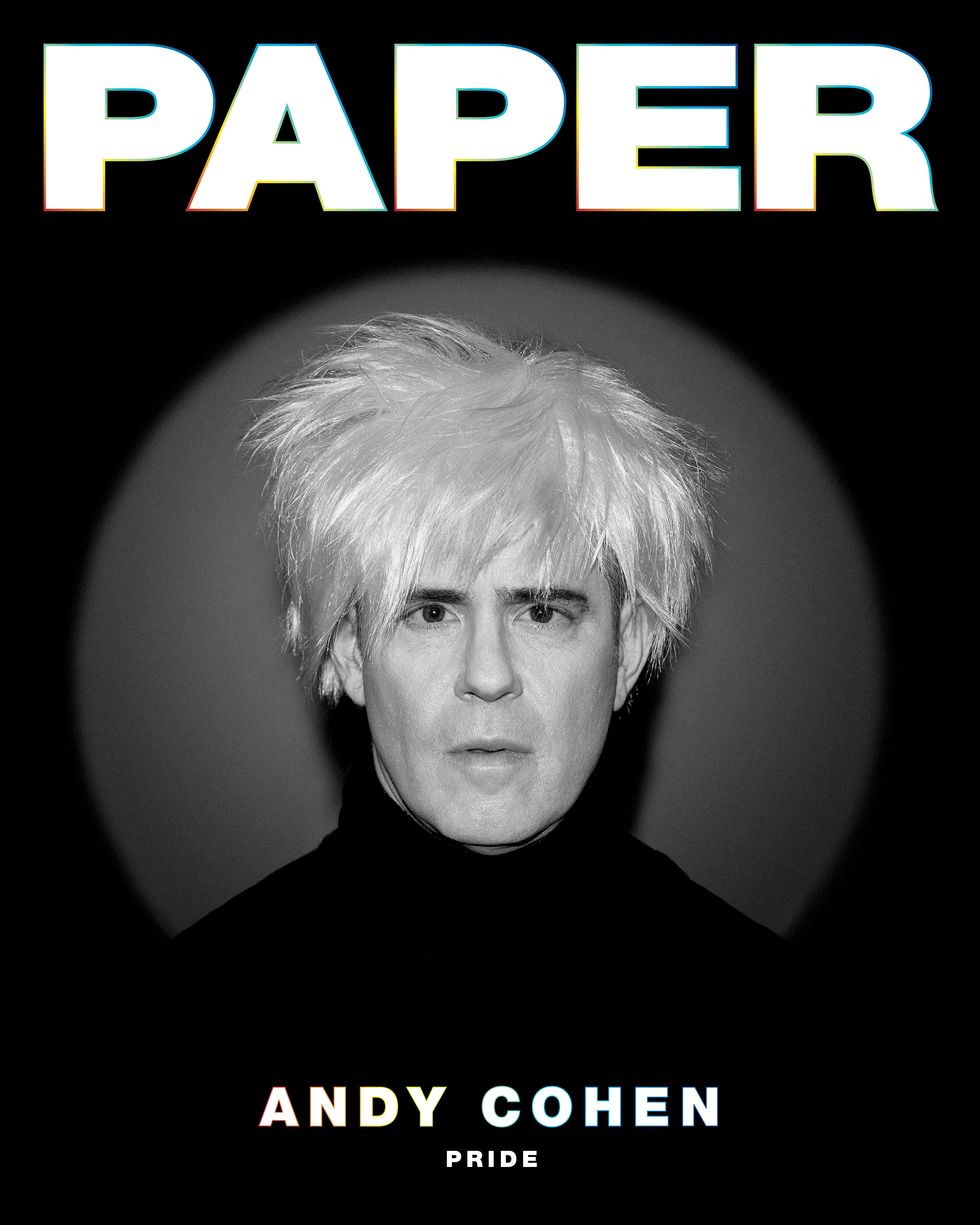
At a live taping of the show, it's clear that Cohen's memory is unsurprisingly aided by the help of notecards, a teleprompter and a team of quick-footed producers. There's also a certain level of mental and emotional cruise control happening, undoubtedly required of any figure as consistently public as Cohen. As guests Lisa Rinna (Real Housewives of Beverly Hills) and Celeste Barber — an actress best known for her comedic recreations of celebrity Instagram posts — kiki over cocktails, Cohen leans back in his chair, cards in hand and crooked smile fixed to his face as he deftly fields audience calls, plays parlor games, laughs gamely at a Barber gag — lifting up her dress to show off spandex bike shorts printed with Andy Warhol-esque portraits of Lisa Rinna's face — and riffs with the audience of no more than 30 eager fans. It's an intentionally intimate setting, made to replicate his Greenwich Village duplex — a stuffed dog that looks like his rescue mix, Wacha, placed in a basket next to his chair and all.
True to his word, despite it being only a day after our interview at a sunny outdoor cafe in the Village where we sat with the actual Wacha and talked over iced teas, when Cohen pauses for a photo opp with me after what feels like the quickest hour in television history, he doesn't recognize me, at all.
But back to those bike shorts. The cameras and live audience, goaded by those producers in headsets, went wild for them and the inherent absurdity of Rinna's face printed like Marilyn Monroe stamps all over Barber's crotch. A certain lowbrow sensibility made into money-making art is exactly what Cohen, like Warhol before him, had in mind when he first created Housewives out of raw footage of nouveau riche Orange County women living their lives for the omnipresent cameras.
"So much of what [Warhol] was talking about came true," Cohen says. "Today, part of me thinks that he would be painting the Real Housewives, because they're real people that became famous, and there's something larger than life about them. They could be a part of his Factory, in a weird way. They're part of mine."
Cohen isn't the first successful businessman-cum-artiste to compare himself to Warhol, but he may be the most accurate in doing so. If Warhol was the center around which New York's freakiest egos rotated, then Cohen is the radiantly hot sun around which the Bravolebrities, as they're called, orbit. Like Warhol's superstars, Cohen's characters find their fifteen minutes can quickly turn into an hour or two, given the right branding.
Related | Sonja Morgan Models Telfar
And what makes a good reality star? "Someone who's funny and unique and interesting to watch. Someone who has something to say, and is different, surprising and just watchable," Cohen says. "There's a fine line between people who are desperate to be on reality television, and people who you want to watch on reality television. The Venn diagram of desperation and watchable, it's a very slim thing in the middle where it overlaps, and you're like, 'That's the bullseye, that's Nene Leakes, that's Vicki [Gunvalson], that's Bethenny [Frankel]."
All veteran housewives of over a decade, those three women anchor some of the franchise's strongest installments, repping Atlanta, Orange County and New York City respectively. Cohen has known some of them for over 13 years.
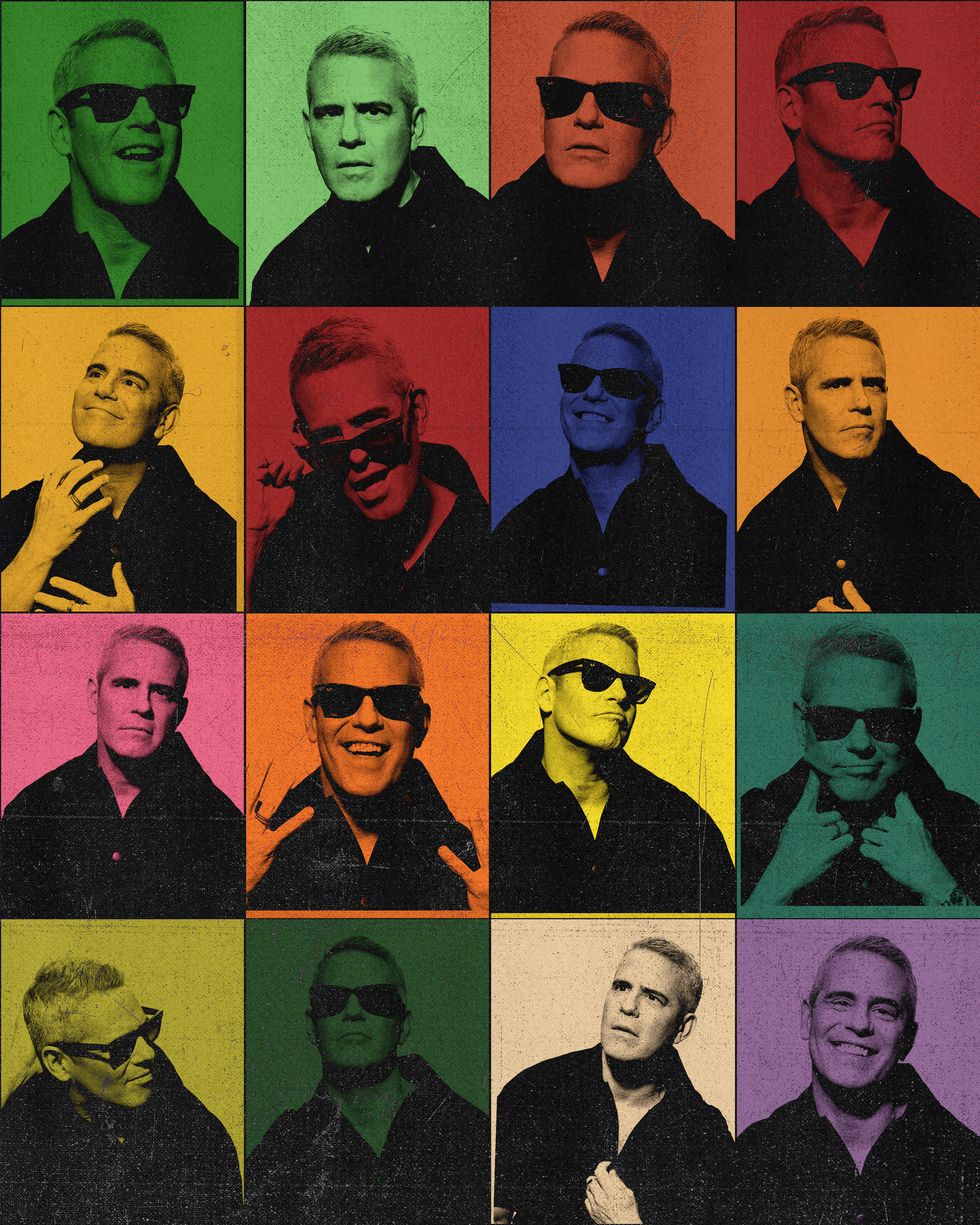
Sunglasses: Ray Ban
"I very much believe in boundaries," he says. "And sometimes I keep boundaries up with people who have no boundaries. These are people who invite cameras into their homes." It's not uncommon for the people Cohen has turned into stars to refer to him as a father figure; reached for comment for this story, Rinna said simply: "Andy Cohen is the BIG DADDY of pop culture."
Cohen admits, "It's a complicated relationship."I'm a boss, I'm a friend... I'm an adversary, I'm a button pusher. I've become legitimately friends with many of them. I care about them. So it's nuanced. And sometimes it's great and sometimes it's not great. It's an emotional relationship."
We all have daddy issues; just consider the collective conscience that chose to elect a narcissistic brute to the highest Big Daddy office in the land. During our national psyche's intake by a cavalcade of writers, thinkers and armchair psychologists following that decision, Cohen's name was submitted as a contender for the reason behind why the prudish American sensibility had suddenly turned so vulgar, but to hear it from Cohen, we've maybe always been this way. The elements already existed; he's just here to point out the obvious.
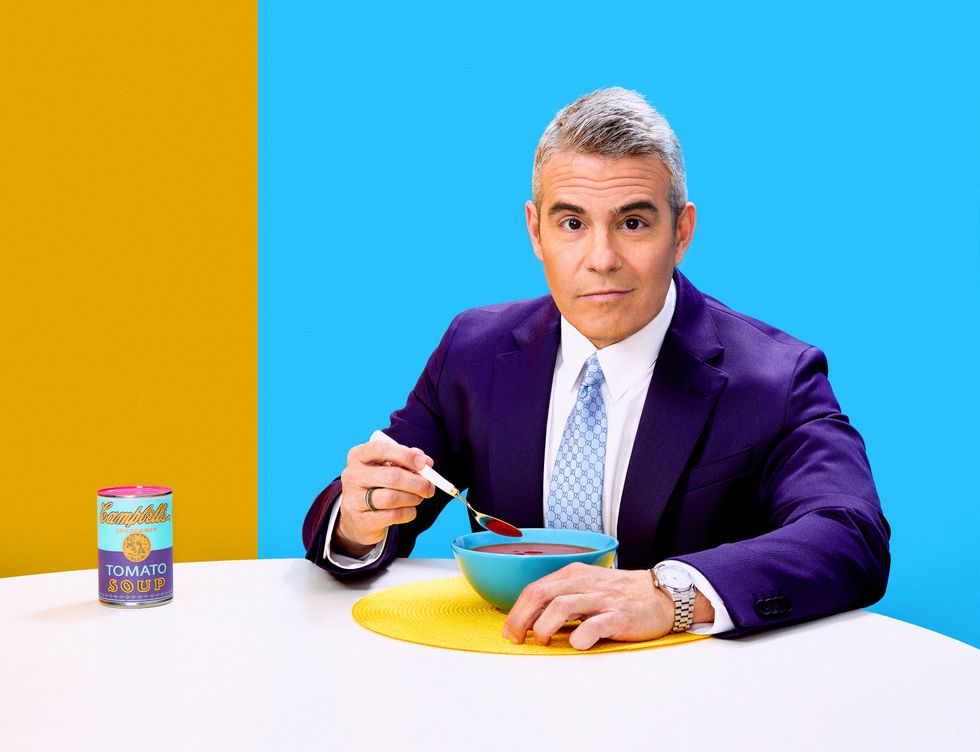
Suit: Hugo Boss, Shirt: Versace, Tie: Gucci, Diamond Rings: Norman Silverman
"I don't think there's anything entertaining about what's going on in Washington right now," Cohen clarifies. "I think that what can't be underestimated is how comfortable this beast is in front of the camera. What he's learned is how to take people down, and that a certain part of the population has responded to that positively in the political arena, I find gross," he says. "[Trump] has made us a conflict based society, and it's upsetting."
Describing himself as both a realist and an optimist made sad by our current state, Cohen also revealed that the most popular polls on WHHL are those that ask the audience to pick a side in a battle, usually one between friends.
"The polls we get the most votes on, are, 'Whose side are you on? Bethenny or Carol? Nene or Cynthia?'" he says. "It's like, 'Wow, we got 15,000 votes in two minutes,' you know? People like to pick a side."
Our innate fondness for judging human behavior is part of what makes Bravo shows so successful, Cohen says. Though it's rarely totally impossible to guess what he's thinking, Cohen's public persona is grounded in lighthearted neutrality amidst a whirlwind of polarizing characters. "I stabilize unstable situations," Cohen says. "I let things roll off me."
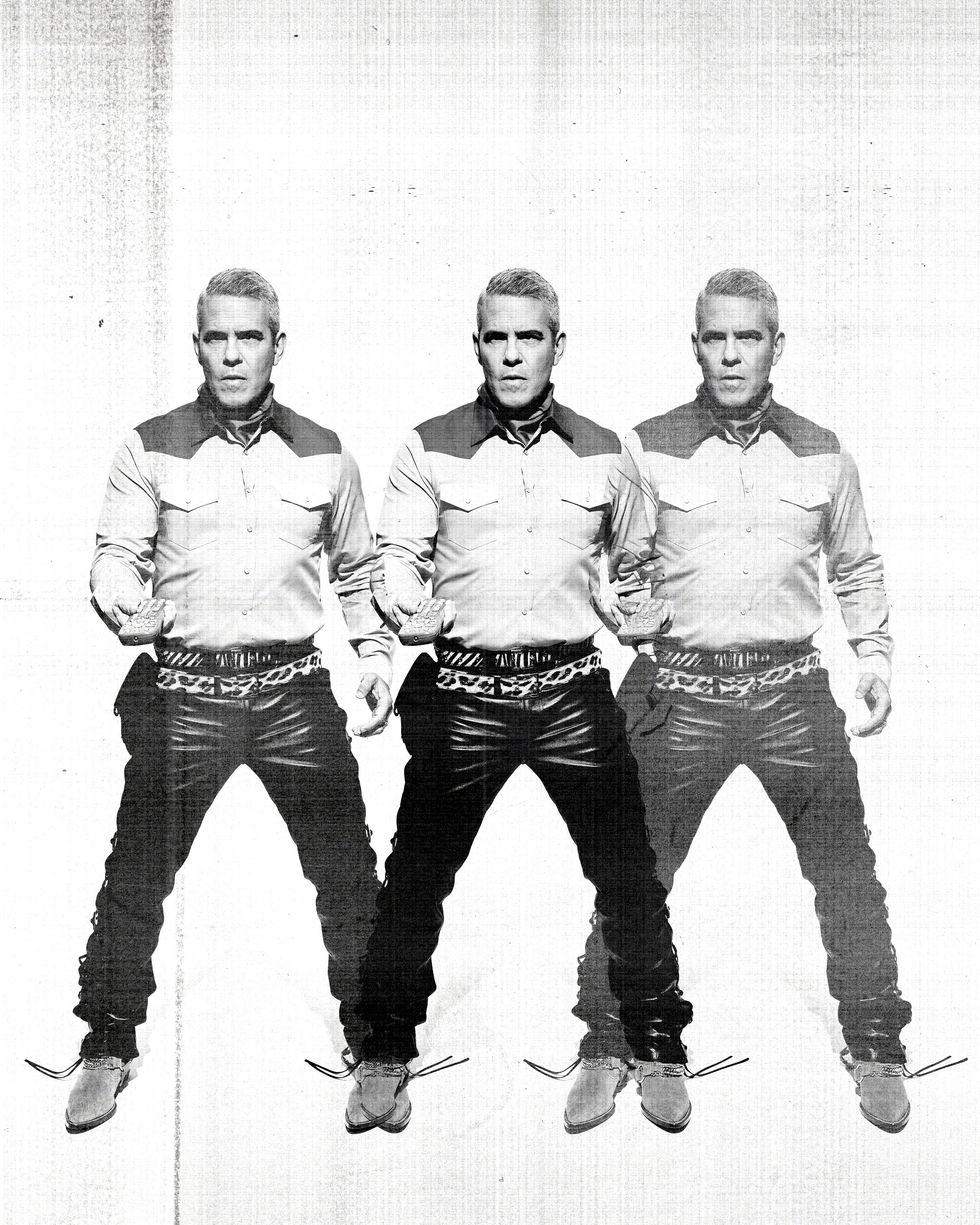
Scarf: Gucci, Shirt: Sandro, Belts & Shoe: Amiri
Conflict, Cohen knows, is precisely what keeps audiences tuned in, so long as it's relatable enough that it could be happening to someone we know, but still set in a cosmos fabricated enough to feel far, far away. The fourth wall may have been shattered by reality television, but a transparent yet solid fifth wall remains — it may be reality, but it's still TV. And though Cohen won't say he's ever regretted a casting decision, there's a definite if undefined line a star can cross that gets them booted from the stage.
"If they become a turn-off to viewers, for whatever reason — they appear too fake, they're not interesting, they're not entertaining," then they're no longer fit for our consumption (or their contract), Cohen says. "When people cross the line and it becomes unreal, that's when they are out." As to whether that extends to our political circus? "I don't know," Cohen says. "Part of me thinks that if the economy stays doing as good as it is that he'll be reelected."
Andy Warhol knew that there was no such thing as a guilty pleasure, that the now ubiquitous High/Low concept so beloved in modern fashion for its accessible irony and cheaper price points is the only mashup that matters. "What's great about this country," Warhol wrote, "is America started the tradition where the richest consumers buy essentially the same things as the poorest. You can be watching TV and see Coca-Cola, and you can know that the President drinks Coke, Liz Taylor drinks Coke, and just think, you can drink Coke, too. A Coke is a Coke and no amount of money can get you a better Coke than the one the bum on the corner is drinking. All the Cokes are the same and all the Cokes are good. Liz Taylor knows it, the President knows it, the bum knows it, and you know it." Swap out Taylor for Kendall Jenner, and we're in business.
---
"Authenticity is important in everything I do," Cohen says, slipping his gold-rimmed aviators down his nose to look me in the eye. "I think it's the reason WWHL has been going for 10 years. We don't pre-interview our guests, it's live, and it's a totally unique experience for a half an hour."
Like his broadcasting hero Howard Stern, Cohen has a knack for getting people to share things they normally wouldn't on air. Whether it's on his SiriusXM channel RadioAndy, WWHL or a Housewives reunion, audiences know that a Cohen interview will always be juicy. "[The viewer] knows that if Mariah Carey sits in my chair, or Oprah, or Lady Gaga, or anyone, they're going to see a different kind of interview than they would if they watched them on another show."
As the only openly gay host on late night, Cohen's snagged an underserved demographic that's likely much wider than you'd guess. In a culture relentlessly insistent on rendering women completely invisible after the age of 40 (or even younger), audiences thirst for storylines based solely on the waves of female life — including career, marriage, motherhood, loss, sex, surgery and of course, friendship. A new parent himself, Cohen's entrance into fatherhood has softened the way many of the women he works with view him.
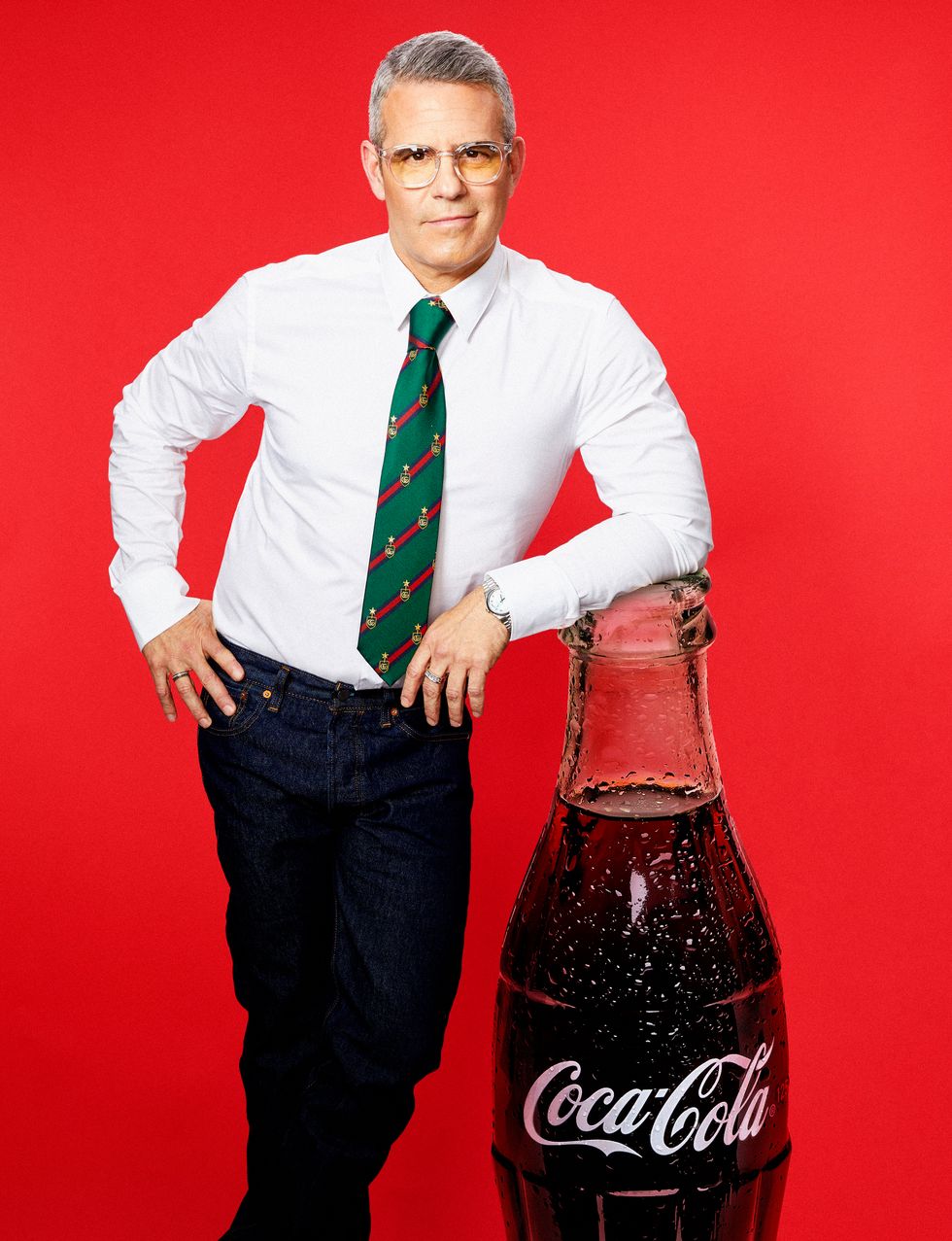
Glasses: Quay, Shirt: Versace, Tie: Gucci, Pants: Levis
"Something happened when I became a father, where a lot of the women really responded in a very humanistic way," he says. "They're all moms, and they all kind of nurtured me in a way that was really sweet and responded to me in a way that they had never responded to me. It broke down some of the barriers that I had put up."
Having a child [via a surrogate, an issue he now advocates around politically], was something Cohen had been considering for years. "It was very much present in my mind: is my destiny just to be on TV and do what I'm doing and lead this super fun life, or is there something deeper for me?'" he says. "It took me 50 years to be ready to settle down, but I was. I always wanted a family and just was never in a place where it was my time."
Most of Cohen's time since first landing in New York has been spent crafting that 'super fun life.' The St. Louis native originally had his sights set on being a reporter, moving from small market to market, breaking stories and reporting on local news. An internship at CBS in New York during college turned on a different switch. "Once I did that, I was like, 'Oh, forget it. I'm moving straight here when I graduate.' Which is what I did."
Somehow, his first night in New York, Cohen spotted Warhol from afar on Madison Avenue. "I was with my girlfriend Jackie. We screamed his name, and we couldn't believe it," he says. Did Warhol turn around? "I think he kept going, actually. It was just a chance..."
On the phone a few days after the WWHL taping, Cohen apologizes profusely for our somewhat awkward interaction after the show. Always the diplomat, he warmly says he wishes he'd had more time to chat. But I suspect that really, among the hundreds of faces he saw that week, mine just didn't register. I wasn't offended but slightly surprised — my appearance tends to make me, for better or for worse, pretty memorable. But in the context of Warhol, banal things like a bad memory for faces can't help but absorb a deeper meaning.
"I always suspected that I was watching TV instead of living life," Warhol said. "People sometimes say that the way things happen in movies is unreal, but actually it's the way things happen in life that's unreal... The channels switch, but it's all television."
Photographer: Gizelle Hernandez
Stylist: Cody Allen
Set Design: Daniel Luna
Hair: Carolina Yasukawa
Groomer: Molly Greenwald